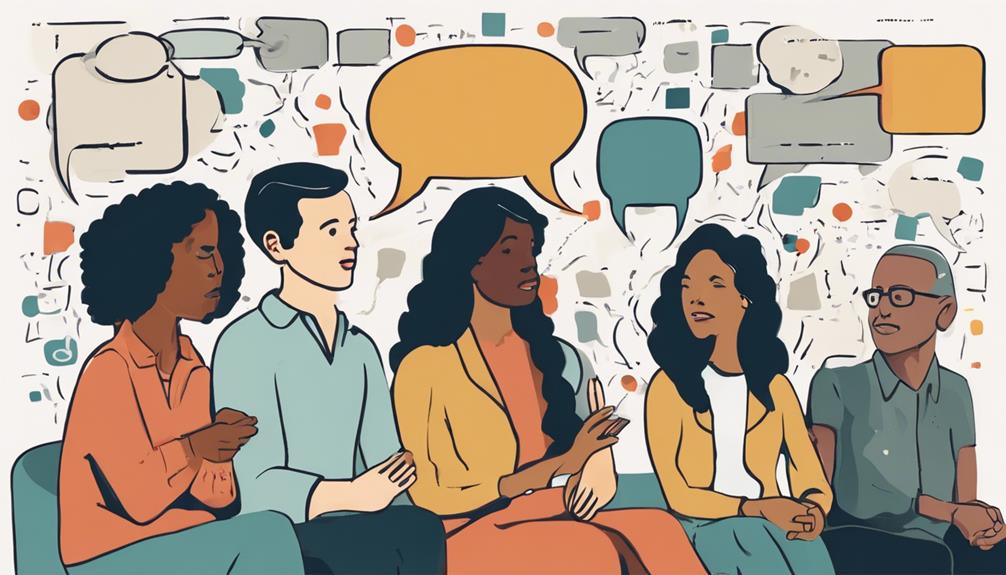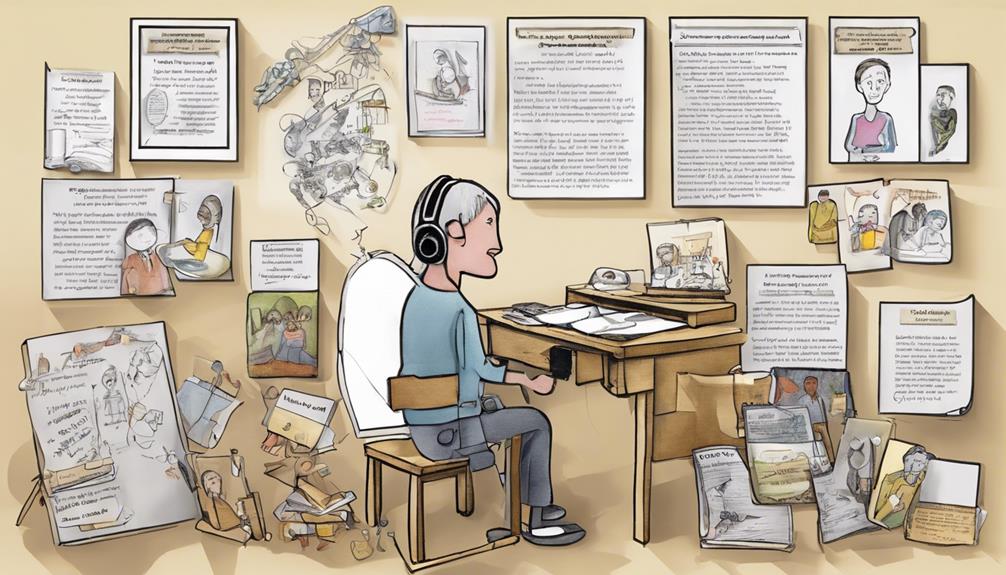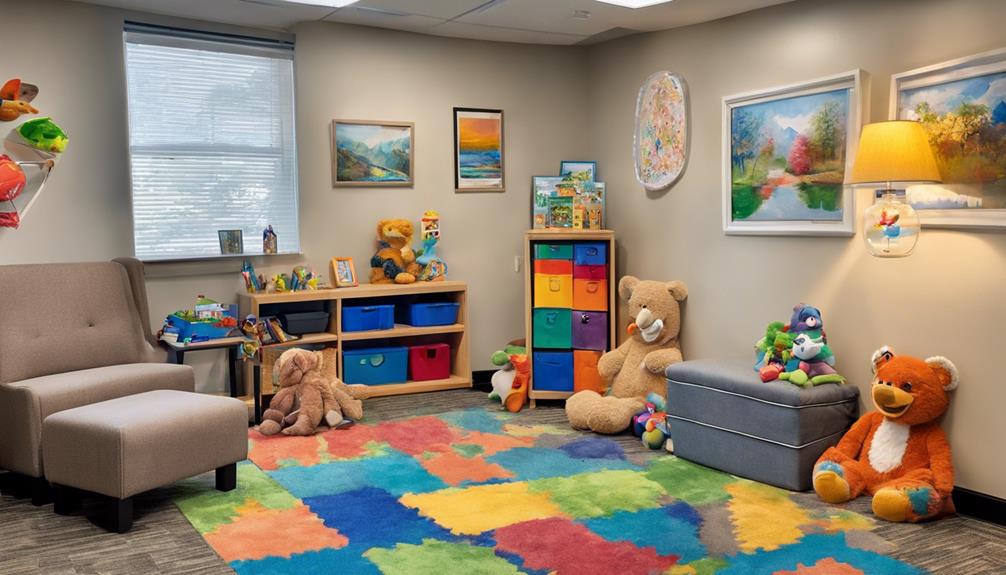When it comes to improving communication through auditory memory speech therapy goals, we are all familiar with the saying ‘practice makes perfect.’ But what specific objectives should we strive for to effectively enhance our auditory memory skills?
By exploring these 10 targeted objectives, we can pave the way for more effective and efficient communication strategies that benefit both individuals receiving therapy and those around them.
Key Takeaways
- Strengthen auditory memory through techniques like repetition and mnemonic devices.
- Set measurable goals to track progress in improving communication abilities.
- Enhance memory retention with regular exercises, visual aids, and association techniques.
- Optimize working memory for accurate reproduction of spoken words to achieve speech therapy goals.

Snow 12 Inch Foldable Portable Video Magnifier by Zoomax with OCR for Low Vision & Reading Assistance – HD Display, 19x Magnification, Text-to-Speech, & 20+ Language Support
VERSATILE FOLDING STAND: Enjoy stability and flexibility with the foldable stand of the Zoomax SNOW 12, perfect for...
As an affiliate, we earn on qualifying purchases.
Enhancing Listening Skills
Enhancing listening skills is a crucial aspect of auditory memory speech therapy goals as it directly impacts communication outcomes. Auditory memory plays a vital role in how we process and retain spoken information, affecting our ability to recall words, follow instructions accurately, and retain numbers. By focusing on strengthening auditory memory, individuals can experience improved comprehension, retention, and overall communication abilities.
In auditory memory speech therapy, various strategies are employed to enhance listening skills. Techniques such as repetition, the use of visual aids, and mnemonic devices are commonly utilized to help individuals better retain and recall information they hear. Setting measurable goals for auditory memory can aid in tracking progress and customizing interventions to meet specific needs effectively. By honing listening skills through targeted interventions, individuals can experience significant improvements in their ability to understand, retain, and effectively communicate information.

MoreDisp Digital Magnifier 5 Inch,Electronic Auto Focus Reading Aid Simplified Buttons Digital Video Magnifier for The Visually Impaired, Low Vision, Color Blindness, Amblyopia,26 Color Modes
【High Power Magnification】This 5.0 inch portable magnifier reading aids provide 2X-32X zoom magnification, the unit has been an...
As an affiliate, we earn on qualifying purchases.
Improving Information Retention

When it comes to improving information retention, we focus on recall techniques, memory aids, and repetition strategies.
These tools can help us remember and grasp spoken information more effectively.
Recall Techniques for Retention
To enhance memory retention for auditory information, utilizing recall techniques such as chunking, rehearsal strategies, mnemonic devices, active listening practices, and spaced retrieval can significantly improve information retention. Here are four key ways these techniques can benefit individuals seeking to enhance their auditory memory:
- Chunking Techniques: Breaking down complex information into smaller, manageable chunks aids in easier retention.
- Rehearsal Strategies: By repeating information aloud or mentally, memory retention for auditory information is strengthened.
- Mnemonic Devices: Acronyms and visualization techniques assist in remembering and retaining crucial details effectively.
- Active Listening Practices: Summarizing and paraphrasing spoken information actively engages the brain, leading to improved retention of auditory content.
Memory Aids for Learning
Utilizing memory aids such as mnemonics, visualization, and chunking techniques can significantly enhance information retention for individuals seeking to improve their learning abilities. These memory aids play a crucial role in enhancing recall of important details in conversations, instructions, and learning materials.
Visual cues, verbal cues, and repetition are effective tools for individuals facing auditory memory challenges. By incorporating memory aids into daily communication and tasks, individuals can store and retrieve information more efficiently.
In speech therapy, implementing memory aids can support better understanding, processing, and retention of spoken information. When individuals actively engage with memory aids tailored to their needs, they can enhance their learning experience and improve their overall communication skills.
Repetition Strategies for Recall
Implementing repetition strategies is a key method for enhancing information retention in auditory memory. Repetition involves repeating information multiple times, whether aloud or mentally, to improve recall.
Here are four ways repetition strategies can benefit individuals seeking to enhance their auditory memory skills:
- Enhanced Recall: By consistently rehearsing information through repetition, individuals can improve their ability to recall spoken words.
- Neural Strengthening: Repetition aids in strengthening neural connections associated with memory, facilitating better retention and retrieval.
- Improved Communication: Regular practice of repetition techniques can lead to enhanced communication skills and clearer expression.
- Memory Enhancement: Utilizing repetition strategies can help individuals retain and recall information more effectively, boosting overall auditory memory abilities.

RayHong 5.0 Inch Digital Magnifier,3X-48X Zoom Electronic Reading Aid,Simplified Buttons Digital Video Magnifier for The Visually Impaired, Low Vision, Color Blindness, Amblyopia
🔎【High Power Magnification】This 5.0 inch portable magnifier reading aids provide 3X-48X zoom magnification, the unit has been an...
As an affiliate, we earn on qualifying purchases.
Strengthening Recall Abilities

When it comes to strengthening recall abilities, we focus on effective memory recall techniques, enhancing memory skills, and implementing memory improvement strategies.
These aspects play a crucial role in enhancing auditory memory and facilitating better communication through accurate recall of spoken information.
Memory Recall Techniques
To enhance memory recall abilities effectively, individuals can utilize strategies such as visualization, association, and repetition. These techniques play a crucial role in strengthening the ability to remember and retrieve information accurately, ultimately improving communication skills.
Here are four ways to strengthen memory recall abilities:
- Mnemonic Devices: Engage in creating memory aids like acronyms or rhymes.
- Chunking Information: Break down information into smaller, manageable parts for easier recall.
- Practicing Retrieval: Regularly test yourself on the information you want to remember.
- Consistent Implementation: Make these techniques a habit to see significant improvements in memory recall and communication skills.
Enhancing Memory Skills
Enhancing memory skills through targeted speech therapy goals can significantly improve the retention and recall of auditory information, enhancing overall communication abilities.
Working memory, a crucial component of memory skills, plays a vital role in storing and manipulating information temporarily. By focusing on speech therapy goals that enhance working memory, individuals can better process and remember spoken words and instructions.
Strengthening working memory through specific exercises and techniques can lead to more effective communication and understanding in daily interactions.
Speech therapy goals aimed at optimizing working memory capacity enable individuals to retain and reproduce spoken words accurately, aiding in comprehending and responding to verbal information.
Improving memory skills, particularly working memory, in speech therapy can have a profound impact on an individual's ability to engage in effective communication.
Memory Improvement Strategies
Implementing mnemonic devices, repetition, and chunking techniques strengthens memory retention for auditory information, enhancing recall abilities in individuals with auditory memory challenges. When focusing on working memory skills, here are some strategies to consider:
- Engage in memory exercises regularly to keep the brain sharp and improve recall abilities.
- Use visual aids to supplement auditory information and enhance memory encoding.
- Practice association techniques to link new information with existing knowledge for better retention.
- Explore multisensory approaches that involve multiple senses to reinforce memory pathways and boost recall effectiveness.

Portable Digital Video Magnifier, Electronic Reading Aid 5.0 Inch with Foldable Handle for The Visually Impaired Macular Degeneration Low Vision, 2X-32X Times Zoom 26 Color Modes
【High Power Magnification】This 5.0 inch portable magnifier reading aids provide 2X-32X zoom magnification, the unit has been an...
As an affiliate, we earn on qualifying purchases.
Boosting Communication Proficiency

Improving our auditory memory skills can significantly boost our communication proficiency by enhancing our ability to recall spoken information accurately. By setting auditory memory goals tailored to specific deficits, we can improve our overall communication skills. These goals may include tasks like following spoken instructions, remembering numbers, or reproducing sentences effectively. Better auditory memory leads to improved comprehension and retention of verbal information, benefiting both conversations and academic settings. Through targeted goals, individuals can address auditory memory challenges and experience increased success in various communication tasks and interactions.
| Benefits of Setting Auditory Memory Goals | Emotional Impact |
|---|---|
| Enhanced communication proficiency | Confidence boost |
| Improved comprehension in conversations | Reduced frustration |
| Better retention of verbal information | Increased sense of accomplishment |
Setting auditory memory goals not only aids in communication but also brings emotional benefits such as boosted confidence, reduced frustration, and a sense of accomplishment.
Enhancing Auditory Comprehension

Strengthening our auditory comprehension skills is essential for enhancing our ability to understand spoken language effectively. Improving auditory comprehension can significantly impact our daily interactions and communication.
Here are four key ways in which enhancing auditory comprehension can benefit individuals:
- Increased Confidence: As auditory comprehension improves, individuals may feel more confident in social situations where listening and understanding spoken language is crucial.
- Enhanced Relationships: Better auditory comprehension can lead to improved relationships with friends, family, and colleagues by reducing misunderstandings and enhancing communication.
- Improved Academic Performance: Strong auditory comprehension skills are vital for educational success, as they aid in following lectures, understanding instructions, and retaining information.
- Boosted Independence: Individuals with enhanced auditory comprehension skills may experience increased independence in daily tasks, such as following directions, engaging in conversations, and participating in group activities.
Developing Memory Strategies

Enhancing our auditory comprehension skills sets a strong foundation for exploring effective memory strategies in speech therapy. Memory strategies play a vital role in improving communication abilities. These strategies encompass various techniques such as using mnemonic devices, chunking information, and practicing retrieval methods. Tailoring memory strategies to individual preferences and learning styles can significantly enhance their effectiveness. Consistent practice and reinforcement of these strategies are crucial for long-term retention and improvement in memory recall.
Incorporating external aids like calendars, reminders, and digital apps can provide valuable support for memory strategies in daily life. By working collaboratively with a speech therapist, individuals can develop personalized memory strategies tailored to their specific needs and goals. This collaborative approach not only fosters a deeper understanding of effective memory techniques but also ensures that these strategies are seamlessly integrated into everyday communication practices. By actively engaging in the development and implementation of memory strategies, individuals can experience enhanced communication outcomes and improved overall quality of life.
Improving Verbal Processing

Exploring strategies to optimize verbal processing skills is essential in auditory memory speech therapy goals. Improving auditory memory can significantly enhance an individual's ability to understand and respond to verbal information effectively.
Here are four key strategies that can aid in enhancing verbal processing skills:
- Utilize Multisensory Techniques: Engage multiple senses like hearing, seeing, and touching to reinforce verbal information, making it easier to remember and process.
- Implement Structured Practice Sessions: Regular practice sessions with a structured format can help strengthen auditory memory skills and improve verbal processing abilities over time.
- Encourage Active Listening: Actively engaging with spoken information by asking questions, summarizing content, or paraphrasing can boost auditory memory and enhance comprehension.
- Incorporate Visual Aids: Visual cues such as charts, diagrams, or written notes can complement auditory information, aiding in better retention and processing of verbal content.
Enhancing Speech Clarity

To enhance speech clarity, incorporating targeted exercises that focus on auditory memory can significantly improve recall and pronunciation accuracy. By improving auditory memory, individuals can better retain and reproduce spoken words and instructions, leading to clearer communication with others. Enhanced auditory memory skills enable individuals to follow conversations more effectively, reducing misunderstandings and enhancing overall comprehension.
One key goal in enhancing speech clarity through auditory memory is the ability to retain and repeat spoken numbers and syllables accurately. This skill is essential for clear articulation and precise communication. Additionally, practicing the accurate reproduction of spoken sentences can greatly impact speech clarity, as it helps individuals maintain coherence and fluency in their speech.
Furthermore, developing strategies to recall unrelated spoken syllables can also have a significant effect on speech clarity. These exercises can improve the ability to organize thoughts and articulate them clearly, ultimately enhancing communication effectiveness in various settings.
Boosting Conversation Recall

Boosting conversation recall can be achieved through targeted auditory memory strategies. By focusing on improving auditory memory, individuals can enhance their ability to remember and recall spoken information, leading to more effective communication.
Here are four key strategies to boost conversation recall:
- Practice Active Listening: Engage fully in conversations by concentrating on the speaker, making eye contact, and asking clarifying questions. Active listening helps imprint information in memory for easier recall later.
- Utilize Mnemonic Devices: Create mnemonic devices or mental associations to link new information to existing knowledge. This technique aids in retaining spoken details and recalling them when needed.
- Repetition and Summarization: Repeat key points during a conversation and summarize them afterward. This reinforces memory retention and aids in recalling important aspects of the discussion.
- Visualize Information: Create mental images or visual representations of what's being said. Visual cues can enhance memory recall and make it easier to remember conversations accurately.
Strengthening Communication Effectiveness

When focusing on strengthening communication effectiveness, we aim to enhance clarity, recall, and fluency through specific strategies.
Memory exercises play a crucial role in improving recall abilities, allowing us to remember and process information more effectively.
Communication Strategies for Clarity
Implementing clear and concise communication strategies is essential for enhancing understanding and retention of spoken information in auditory memory speech therapy goals.
To achieve clarity in communication, consider the following:
- Visual Aids: Incorporate visual cues to reinforce key points and support auditory memory.
- Active Listening: Encourage active listening techniques like summarizing and asking clarifying questions to enhance comprehension.
- Repetition and Rehearsal: Practice repeating important information to strengthen auditory memory skills.
- Mnemonic Devices: Utilize memory techniques to aid in remembering crucial details during conversations.
Memory Exercises for Recall
How can memory exercises for recall enhance communication effectiveness by improving the ability to remember and retrieve information accurately?
Memory exercises targeting auditory memory play a crucial role in strengthening the capacity to recall spoken words, phrases, and instructions. By honing auditory memory skills, individuals can better retain and reproduce information heard, facilitating clearer communication.
Engaging in these exercises enables individuals to follow conversations, recall important details, and respond appropriately in various communication contexts. The practice of memory exercises for recall not only enhances auditory memory but also significantly boosts overall communication skills, leading to more effective interactions with others.
Therefore, incorporating these exercises into daily routines can bring about notable improvements in communication clarity and effectiveness.
Practice for Fluency
To improve communication effectiveness, individuals can enhance their fluency through targeted practice of speech sounds and patterns, fostering clearer expression of thoughts and ideas. Practicing for fluency involves repetitive exercises focusing on specific speech elements to enhance the smoothness and speed of communication.
Here are some emotional benefits of fluency practice:
- Enhanced confidence in social interactions.
- Improved clarity in expressing ideas.
- Better engagement in public speaking.
- Increased effectiveness in conveying thoughts.
Frequently Asked Questions
What Are the IEP Goals for Auditory Memory?
We've specific IEP goals for auditory memory that focus on enhancing the ability to recall spoken words accurately. These goals involve following spoken instructions, retaining and repeating spoken numbers, and recalling unrelated spoken syllables.
The primary aim is to improve the capacity to reproduce spoken sentences accurately, ultimately enhancing communication skills. These goals target challenges in processing and recalling spoken information to support better auditory memory.
What Are the Memory Strategies Goal for Speech Therapy?
We implement memory strategies like visualization, repetition, and association techniques in speech therapy to enhance recall and retention. Spaced retrieval techniques and personalized mnemonic devices are key components.
Chunking information, mental imagery, and multisensory cues are common strategies. These memory goals aim to improve overall memory function and information retention for better communication outcomes.
What Is a Smart Goal for Auditory Comprehension?
When setting a SMART goal for auditory comprehension, we focus on enhancing the ability to understand and recall spoken information accurately. By establishing specific, measurable, achievable, relevant, and time-bound objectives, we aim to boost auditory memory skills.
This goal targets improving the capacity to follow and remember spoken instructions, conversations, and information. Ultimately, enhancing auditory memory helps us process spoken language more accurately and efficiently.
How Can Auditory Memory Be Used to Improve Effective Oral Instruction?
When it comes to boosting oral instruction effectiveness, utilizing auditory memory is like having a trusty sidekick – helping us grasp and retain spoken information with precision.
It's our secret weapon for nailing down those verbal instructions flawlessly. By honing our auditory memory skills, we're primed to excel in accurately recalling and processing spoken words and numbers.
It's the key to ensuring seamless communication and understanding in any conversation.
Conclusion
In conclusion, setting auditory memory goals in speech therapy is like planting seeds in a garden. By nurturing these goals, we can cultivate stronger communication skills that blossom and flourish over time.
Just as a garden requires attention and care to thrive, so too does our auditory memory require targeted interventions to reach its full potential.
With dedication and perseverance, we can reap the rewards of improved communication and more effective interactions.
Let's continue to tend to our auditory memory garden for continued growth and success.










